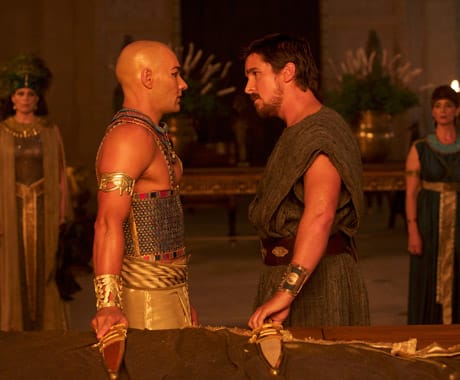Bigger isn't always better. That old adage should have been taken into consideration before Ridley Scott began working on the big-budget, soulless epic Exodus: Gods and Kings, a film that is only awe-inspiring when one considers the mind-boggling cost of its production alone.
Set in 1300 BCE, the film follows Moses (played here by Christian Bale) and his brother Ramses (Australian actor Joel Edgerton). After Moses' adoptive father Seti (John Turturro) passes away and his real son, Ramses, succeeds him, it's revealed that Moses was actually born a Hebrew. Despite being best buds since birth, that doesn't sit well with Ramses and his advisors in the throne room, who decide to banish him from the kingdom he grew up in.
Now understanding the plight of his true people, Moses leads a resistance against all those who persecute them (insert badass action scenes, a handful of plagues and the parting of the seas.)
With a spiritual story of this magnitude, you'd think the film would at least be a little thought-provoking, but Exodus: Gods and Kings is simply a literal reinterpretation of a story we've seen and heard hundreds of times before, and a poor one at that. It's hard to imagine believers even buying into the mishmash of accents (why does Sigourney Weaver speak in an American accent while Christian Bale's character sounds like he's trying to hide he's from the West Midlands?), poorly executed story lines (the film runs two and a half hours but somehow feels twice as long due to its overwrought plot) and gratuitous scenes of violence and destruction (you'll never see so many dead horses in your life) on display here.
Even the casting choices are perplexing, with A-list actors like Ben Kingsley and Turturro playing bit roles that simply move the story along. (Aaron Paul, a year gone from his run on Breaking Bad, appears throughout, but somehow manages to only speak a handful of lines.)
Before the credits roll at the end of the film, a brief line appears on screen from the director dedicating the movie to his late brother, Tony Scott (who sadly committed suicide in 2012). It's hard not to imagine that Ridley was at least partly considering his brother's lasting legacy (and his personal mortality) when deciding to take on such a historically relevant film. But faith and spirituality are merely afterthoughts in Exodus: Gods and Kings, with schmaltz and spectacle taking the lead throughout. That's kind of a problem when you're telling a story central to millions of people's lives.
(Searchlight Pictures)Set in 1300 BCE, the film follows Moses (played here by Christian Bale) and his brother Ramses (Australian actor Joel Edgerton). After Moses' adoptive father Seti (John Turturro) passes away and his real son, Ramses, succeeds him, it's revealed that Moses was actually born a Hebrew. Despite being best buds since birth, that doesn't sit well with Ramses and his advisors in the throne room, who decide to banish him from the kingdom he grew up in.
Now understanding the plight of his true people, Moses leads a resistance against all those who persecute them (insert badass action scenes, a handful of plagues and the parting of the seas.)
With a spiritual story of this magnitude, you'd think the film would at least be a little thought-provoking, but Exodus: Gods and Kings is simply a literal reinterpretation of a story we've seen and heard hundreds of times before, and a poor one at that. It's hard to imagine believers even buying into the mishmash of accents (why does Sigourney Weaver speak in an American accent while Christian Bale's character sounds like he's trying to hide he's from the West Midlands?), poorly executed story lines (the film runs two and a half hours but somehow feels twice as long due to its overwrought plot) and gratuitous scenes of violence and destruction (you'll never see so many dead horses in your life) on display here.
Even the casting choices are perplexing, with A-list actors like Ben Kingsley and Turturro playing bit roles that simply move the story along. (Aaron Paul, a year gone from his run on Breaking Bad, appears throughout, but somehow manages to only speak a handful of lines.)
Before the credits roll at the end of the film, a brief line appears on screen from the director dedicating the movie to his late brother, Tony Scott (who sadly committed suicide in 2012). It's hard not to imagine that Ridley was at least partly considering his brother's lasting legacy (and his personal mortality) when deciding to take on such a historically relevant film. But faith and spirituality are merely afterthoughts in Exodus: Gods and Kings, with schmaltz and spectacle taking the lead throughout. That's kind of a problem when you're telling a story central to millions of people's lives.
